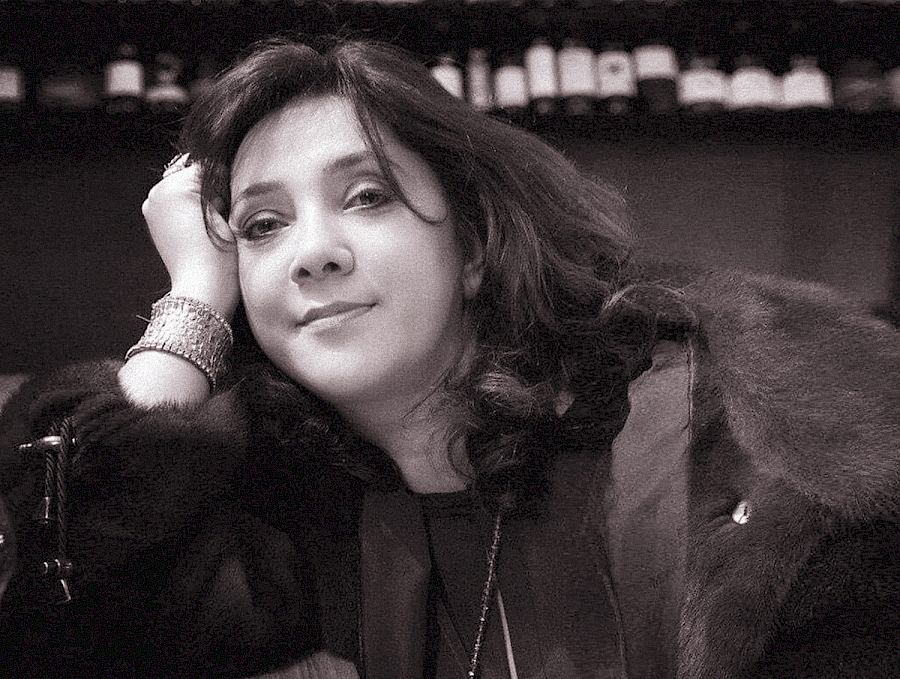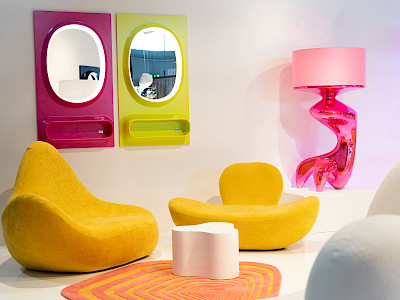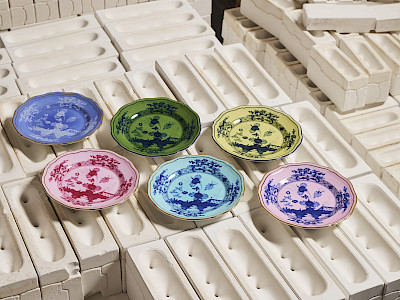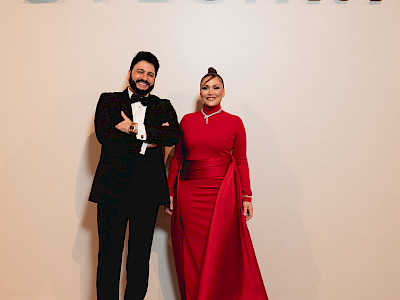
Everyone in Azerbaijan knows her family. Maternal grandfather Alovsat Guliyev is a historian, professor, corresponding member of NANA, and father Ali Mustafabeyli is a diplomat, consul-general, scientist, and holds a head position at the Diplomatic Academy under the Ministry of Foreign Affairs of the Russian Federation. Life connected Gular Mustafabeyli-Delyasud with another country - she fell in love with the homeland of Chateaubriand and Poincaré. But, of course, she does not forget her motherland: she regularly comes to Baku to visit relatives and friends and relax.
Narrate about your childhood.
When I was one and a half years old, my father was invited to work in Moscow, and the whole family moved there. I grew up in Moscow and graduated from a French school. That's where my love for the French language began. However, the connection with Baku was never interrupted.

How did it happen that you, already being a student at the Moscow State University, returned to Baku?
Dad, a specialist in complex countries, went on a mission to Afghanistan in the 1990s. It was forbidden to take children there, so I, after studying at the Moscow State University for a year, transferred to the Faculty of History of BSU. Here I was known as the granddaughter of Alovsat Guliyev, so I simply had no right to study poorly – I studied perfectly. Having received the coveted diploma, I got a job at the Foreign Ministry, where I dealt with my beloved France. I worked with Akshin Mehdiyev, who headed the Department of Europe, the USA and Canada in the ministry. In November 1994, the Azerbaijani embassy was opened in France, headed by Eleonora Huseynova, and started my career there as a cultural attaché. I was only 22...
Was this your first trip to France?
I was already familiar with France; during my student holidays, I went there to visit my aunt Rena Mustafabeyli-Shereshevskaya. She had arrived there in the early '90s, gave master classes, and was eventually invited to stay and work.

What difficulties did you have to face?
There were enough difficulties, because I ended up all alone in a foreign country, wonderful, but with a completely different coordinate system. I had to solve a bunch of domestic issues: I had to rent a house, pay some bills, etc. The work was also serious and required full dedication. It's good that I'm a very sociable person and adapt easily ... Aunt Rena lived in Alsace and was a good moral support for me, plus from time to time my relatives came to visit me. Over time, I made a lot of friends. As it turned out, the French are very friendly and always ready to help.
Tell us about the embassy events in which you participated.
I was involved in many cultural events. I constantly received invitations to various exhibitions, presentations, forums ... I had a kind of thirst for events of this kind: I wanted to see everything, observe everything! It was the time of the birth and formation of relations between the young independent republic and the European powerful state. We were just building bridges. It was extremely difficult and insanely interesting. In the new embassy at that time, not a huge team worked, but a handful of four or five people. These were the years of the first official and state visits at various levels. The first large-scale events took place. I had the great honor to participate in the preparation of the first visits to France by our National Leader Heydar Aliyev. I also curated various UNESCO events, ranging from the agreement on air traffic to the first exhibition of Toghrul Narimanbekov, even before we had a diplomatic mission there.

How long did you work at the embassy in total?
Six years. After that, I left the job, got married, and had children ... A few years later, I returned to the embassy, but this time as an assistant to Tarik Aliyev, who became the new ambassador of Azerbaijan to France. He invited me, and I worked at a local rate. I remember that time with great fondness...
What did you do after leaving your job at the embassy?
I worked in an event management agency, our director was interested in developing relations with the Russian-speaking community. We wanted to organize tourist trips, traveled to Baku, to Moscow... But the pandemic disrupted all our plans: people no longer had time to travel. The director refocused, took up a different field of activity, because the event business suffered greatly from the pandemic. I did the same and changed my profession for the third time - I started teaching Russian at a private Catholic school. I have 15 people or more in each stream, these are large classes. The Russian language is not a compulsory subject, it passes as an additional load, but the students are very motivated - they themselves tell me about Tchaikovsky, Rachmaninov and Tolstoy. Their approach is very fundamental. I get great pleasure from these activities. In addition to Russian to French, I also teach French to Russian-speaking audiences. And I started teaching with a light hand and on the advice of my aunt, Afag Guliyeva, a well-known specialist in French in Baku...


How many children do you have? Where do they live?
I have three children, all of whom live in France. My eldest son is studying at an engineering school in Strasbourg. My second son is 19 years old and studies at the Faculty of Finance and Economics at Assas University in Paris. My daughter, Alice, is 13 years old and is a schoolgirl. Although they were born and raised in France, they have a deep affection for Azerbaijan. For instance, if you ask Alice where she wants to go in the summer, she will enthusiastically say Baku without hesitation. This connection to their ancestral homeland is significant to us, and we plan to visit during the summer. Throughout the war, they were deeply concerned and actively supported Azerbaijan on social networks. I am extremely pleased that my children feel such a strong spiritual bond with their historical roots, and I make an effort to ensure they don't forget their heritage.

You probably noticed that Baku has changed a lot over the years…
The city is now unrecognizable! The infrastructure has changed with many new buildings and other structures being built, especially hotels. I take great pleasure in bringing guests here. My former boss, when he first came to Baku, literally fell in love with it, and this is a man who has traveled all over the world. In his professional projects, he always planned something related to our city. Two years later, I arrived with another group of French people, and they all left in love with 'Caucasian Paris,' speaking with admiration about it at every event they attended.
What do you miss the most?
First of all, I miss my loved ones. The older you get, the more you miss communication with loved ones. As it so happened, we are scattered all over the planet, but we still try to communicate with our relatives as often as possible. And I also miss our kitchen. Nowhere else is the food cooked as tastily as in Baku!

Do you cook something from Azerbaijani cuisine yourself?
I often cook pilaf because my children love rice. Sometimes I make them happy with dolma if I manage to get grape leaves.
Is it difficult to be a member of a famous family? Maybe more responsibility?
Yes, the responsibility was huge, because the family is known on both lines. But at the same time it is also a great pride. I will tell you this case: while in Baku, my children and I somehow stopped at a memorial plaque with the name of my grandfather. I started telling the children in French that my mother lived here. And then a policeman came up and began to tell that a man lived in this house, from whose books he taught history. My children suddenly realized that their great-grandfather is known and remembered. It was an amazing feeling... My paternal grandfather, Midhat Mustafabeyli, was also well known in Baku - he headed the Institute of Geology.

Is it difficult to be a member of a famous family? Perhaps it comes with more responsibility.
Yes, the responsibility was enormous because the family is renowned on both sides. However, it also fills me with great pride. Let me share a heartwarming incident: while in Baku, my children and I came across a memorial plaque with my grandfather's name. I started telling the children in French that my mother used to live here. Suddenly, a policeman approached us and began to explain that a notable man lived in this house, whose books he used to learn history. My children then realized that their great-grandfather was well-known and remembered. It was an amazing feeling... My paternal grandfather, Midhat Mustafabeyli, was also prominent in Baku – he headed the Institute of Geology.



